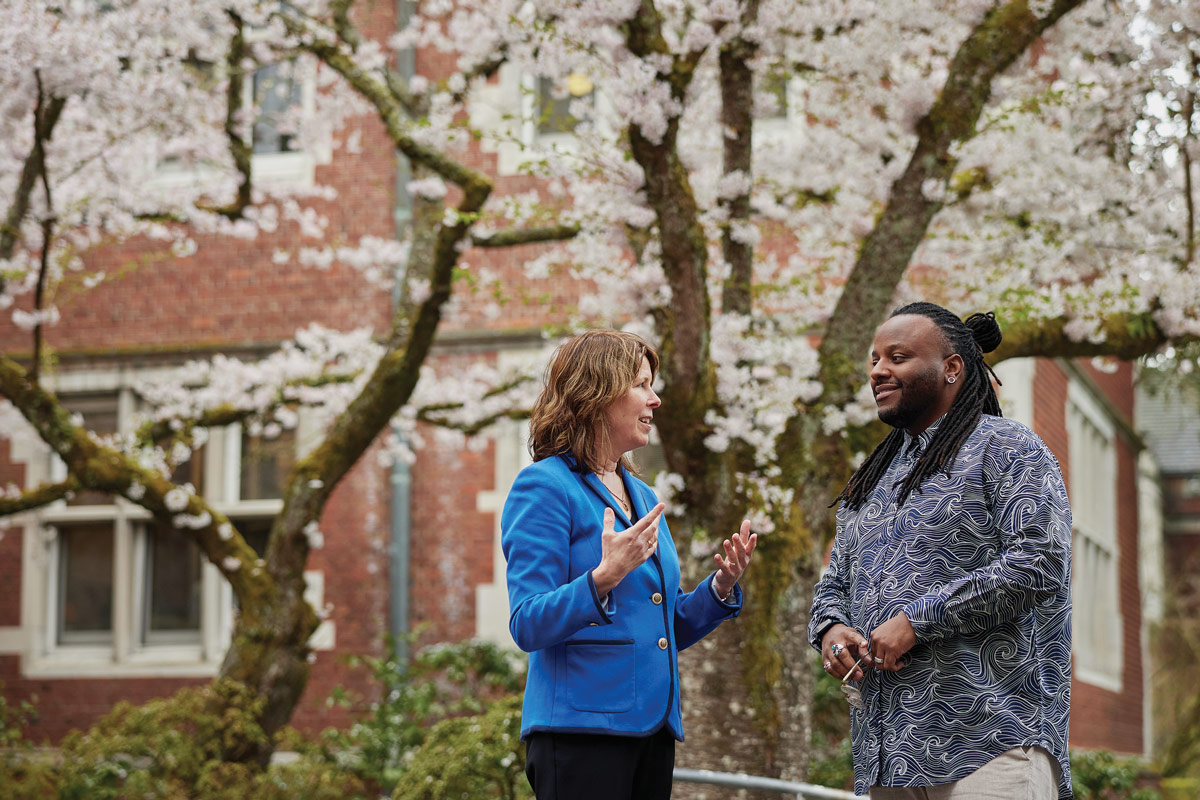Board Service Benefits Reed and the Greater Good
President Bilger and Vice President for Student Life Karnell McConnell-Black share the importance of these volunteer leadership roles.
Serving in a leadership role of any organization can be challenging and time-consuming work, but finding avenues to give back to the profession is something both Reed President Audrey Bilger and Vice President for Student Life Karnell McConnell-Black value. One of those avenues has been to serve on national nonprofit boards that focus on education.
“Why do we participate in national organizations? It’s so that we can connect with other professionals and understand what’s working for other institutions that might be useful for us,” Bilger says. “If we have established that network and those connections, then when we need help or advice there are people we can contact, and we can be helpful to them, too.”
Bilger and McConnell-Black have found that national board service has allowed them to build reciprocal and mutually beneficial relationships with colleagues in higher education and elevate Reed’s reputation across the country. These boards are nonprofit, which means service is done as an uncompensated volunteer. As a member of the Annapolis Group of Liberal Arts Colleges Board of Directors, which is composed of college presidents, Bilger has been able to understand what other institutions are facing and share the innovative work done at Reed College.
“We want people to know that we have good ideas,” Bilger says. “We’re doing some really amazing things on this campus, and by showing up in these national spaces, we’re able to represent our college in many ways. We become walking billboards for the college, and we put Reed on people’s radar.”
Being part of national boards has also helped recruit talented staff in an array of professional roles and continues to grow the positive reputation of Reed in increasingly larger circles.
McConnell-Black’s service has opened up pathways for students who are interested in working in higher education as well.
“It’s about the impact on students, and access for students to these organizations that offer mentorship and pipelines to get involved in higher education professionally after they graduate,” McConnell-Black says.
Importantly, being part of a board allows Reed College to represent the perspective of smaller institutions on a national stage, and it helps amplify Reed’s voice in discussions about the value of a college degree and liberal arts education as a public good. Service on nonprofit boards also allows for advocacy that may not be possible at an individual institution.
“If you’re not in the conversation, then things happen to you without your having any say in the matter,” Bilger says. “Being in the spaces where we’re able to consider how to change the national conversation is really good for the college.”
Learning from colleagues on national boards allows both Bilger and McConnell-Black to bring a fresh perspective to campus.
“When you look around at other institutions, you see your own institution with more clarity,” Bilger says. “That’s really important for a college like Reed that’s committed to continuous growth and progress.”
McConnell-Black was able to write the core competencies for NODA, the Association for Orientation, Transition, and Retention in Higher Education, when he served on that board earlier in his career.
“I felt like it was beneficial to continue to provide service to this organization that could also not only help me and my institution, but also help everyone else at the same time,” McConnell-Black says.
As he steps into service for NASPA, Student Affairs Administrators in Higher Education,
McConnell-Black sees opportunities to make an impact on nearly every aspect of student affairs through the organization’s nationwide membership. He shares what he has learned from his board service with students and alumni, many of whom tell him they want to make a difference in the world. McConnell-Black often advises them to serve on a nonprofit board, be it local, regional, or national, to create change in a meaningful way.
Volunteering for a nonprofit board is “a reward in and of itself,” Bilger says, and service-oriented Reed alumni who believe in lifelong learning should find boards that align with their values.
“To be on a nonprofit board is to do good in the world,” Bilger says. “It’s gratifying work, and you meet some really, really amazing people.”
